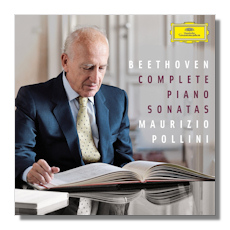
The Internet's Premier Classical Music Source
Related Links
- Beethoven Reviews
- Latest Reviews
- More Reviews
-
By Composer
-
Collections
DVD & Blu-ray
Books
Concert Reviews
Articles/Interviews
Software
Audio
Search Amazon
Recommended Links
Site News
 CD Review
CD Review
Ludwig van Beethoven

Complete Piano Sonatas
- Sonata #1 in F minor, Op. 2 #1
- Sonata #2 in A Major, Op. 2 #2
- Sonata #3 in C Major, Op. 2 #3
- Sonata #4 in E Flat Major, Op. 7
- Sonata #5 in C minor, Op. 10 #1
- Sonata #6 in F Major, Op. 10 #2
- Sonata #7 in D Major, Op. 10 #3
- Sonata #8 in C minor "Pathétique", Op. 13
- Sonata #9 in E Major, Op. 14 #1
- Sonata #10 in G Major, Op. 14 #2
- Sonata #11 in B Flat Major, Op. 22
- Sonata #12 in A Flat Major, Op. 26
- Sonata #13 in E Flat Major, Op. 27 #1
- Sonata #14 in C Sharp minor, Op. 27 #2
- Sonata #15 in D Major "Pastorale", Op. 28
- Sonata #16 in G Major, Op. 31 #1
- Sonata #17 in D minor "Der Sturm", Op. 31 #2
- Sonata #18 in E Flat Major, Op. 31 #3
- Sonata #19 in G minor, Op. 49 #1
- Sonata #20 in G Major, Op. 49 #2
- Sonata #21 in C Major "Waldstein", Op. 53
- Sonata #22 in F Major, Op. 54
- Sonata #23 in F minor "Appassionata", Op. 57
- Sonata #24 in F Sharp Major, Op. 78
- Sonata #25 in G Major, Op. 79
- Sonata #26 in E Flat Major, Op. 81a
- Sonata #27 in E minor, Op. 90
- Sonata #28 in A Major, Op. 101
- Sonata #29 in B Flat Major, Op. 106
- Sonata #30 in E Major, Op. 109
- Sonata #31 in A Flat Major, Op. 110
- Sonata #32 in C minor, Op. 111
Maurizio Pollini, piano
Deutsche Grammophon 4794120 8CDs
Also available on SHM-CD: Amazon - UK - Germany - Canada - France - Japan - CD Universe - JPC
Like everything he has ever done, Maurizio Pollini has drawn a curiously divided mix of opinions with his Beethoven playing over the years. He's tackled the concertos twice, but did not complete his survey of the piano sonatas until 2014. Considering that his first efforts in this repertoire date from 1977, this is a project that quite literally spans the great pianist's entire career for Deutsche Grammophon.
Like most things with most artists, I find Pollini more successful in his earlier efforts than his later ones. Never a supreme colorist as much as he's able to x-ray a score (a la Boulez) his classic readings of the late sonatas from the last part of the 1970s still hold your attention. He's well recorded, and is at the absolute top of his game. Likewise, his early 1990s versions of some of the more famous "name" sonatas stand out for technical polish and a secure grasp of the idiom. That said, the competition is fierce, and the pianist's seriousness and intellectual prowess may not thrill listeners looking for more tonal differentiation and sparkle.
Unfortunately, I find the recordings from the last few years to be lacking. Certainly there is no question of the commitment or intelligence on display. As he's aged, Pollini has lost some of his warmth. Never his strongest quality to begin with, some of these last recordings simply need more emotionally than the pianist provides. Even Arrau, who was a deeply serious and almost anti-virtuoso artist, finds deeper meaning in the early sonatas. On the other hand, there are some nicely captured live efforts here that confirm Pollini as a genius.
I understand the desire to complete the project, because the aforementioned early entries are so worth considering as reference material. I detect very little slowing of the mind or the hands in evaluating these later efforts, but I find that the pianist micromanages details that were sung more fully in previous decades. Also, the sheer number of efforts from this decade indicate to me that the idea to "complete" the cycle may have been a belated marketing idea; there's so few recordings in the years prior.
I'm entirely aware that I sound cynical. The truth of the matter is that the entire set is a remarkable achievement that holds a few absolutely essential recordings. Those that are not benefit from still Pollini's seriousness and integrity as an artist, and the whole set serves as a worthy tribute to the pianistic greatness that the man has given us. The sound is variable, as are the performances, but I can't resist recommending this box to anyone who cares about the piano or the composer generally.
Copyright © 2015, Brian Wigman





















